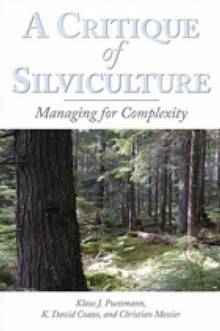A Critique of Silviculture : Managing for Complexity
Puettmann, Klaus J. / Messier,
Éditeur : ISLAND PRESS
ISBN papier: 9781597261463
Parution : 2008
Code produit : 1221192
Catégorisation :
Livres /
Science /
Sciences de la terre /
Sciences de l'environnement
Formats disponibles
| Format | Qté. disp. | Prix* | Commander |
|---|---|---|---|
| Livre papier | En rupture de stock** |
Prix membre : 27,00 $ Prix non-membre : 30,00 $ |
*Les prix sont en dollars canadien. Taxes et frais de livraison en sus.
**Ce produits est en rupture de stock mais sera expédié dès qu'ils sera disponible.
Description
The discipline of silviculture is at a crossroads. Silviculturists are under increasing pressure to develop practices that sustain the full function and dynamics of forested ecosystems and maintain ecosystem diversity and resilience while still providing needed wood products.A Critique of Silvicultureoffers a penetrating look at the current state of the field and providesnbsp;suggestions for its future development. nbsp; The book includes an overview of the historical developments of silvicultural techniques and describes how these developments are best understood in their contemporary philosophical, social, and ecological contexts. It also explains how the traditional strengths of silviculture are becoming limitations as society demands a varied set of benefits from forests and as we learn more about the importance of diversity on ecosystem functions and processes. nbsp; The authors go on to explain how other fields, specifically ecology and complexity science, have developed in attempts to understand the diversity of nature and the variability and heterogeneity of ecosystems. The authors suggest that ideas and approaches from these fields could offer a road map to a new philosophical and practical approach that endorses managing forests as complex adaptive systems. nbsp; A Critique of Silviculturebridges a gap between silviculture and ecology that has long hindered the adoption of new ideas. It breaks the mold of disciplinary thinking by directly linking new ideas and findings in ecology and complexity science to the fi eld of silviculture. This is a critically important book that is essential reading for anyone involved with forest ecology, forestry, silviculture, or the management of forested ecosystems.























